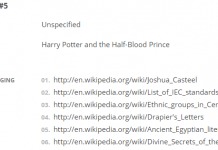 More important ACTA news from BoingBoing. For those of our readers who are concerned about our government negotiating secretly to limit our rights, and to impose those limitations on the rest of the world, BoingBoing’s coverage is a must read. You can find their past coverage at the end of this article on their site:
More important ACTA news from BoingBoing. For those of our readers who are concerned about our government negotiating secretly to limit our rights, and to impose those limitations on the rest of the world, BoingBoing’s coverage is a must read. You can find their past coverage at the end of this article on their site:
Michael Geist writes in with news on the latest draft of the Anti-Counterfeiting Trade Agreement, a secretly negotiated copyright agreement:
“One of the biggest stories over the three year negotiation of ACTA has been the willingness of the U.S. to cave on the Internet provisions. When it first proposed the chapter, the U.S. was seeking new intermediary liability requirements [Ed: That is, liability for ISPs, hosting services, and services like YouTube, Twitter and Blogger] with three strikes and you’re out [Ed: If your ISP receives three unsubstantiated claims of copyright infringement against you, you family is cut off from the net] used as an example of an appropriate policy as well as language that attempted to create a global DMCA. The draft released today is a far cry from that proposal with the intermediary liability provisions largely removed and the DMCA digital lock provisions [Ed: the US law that says that it’s illegal to break a digital lock even if you’re not violating copyright; this is that law that, for example, makes it illegal to jailbreak an iPad to install third-party software not approved by Apple — a recent US Copyright Office ruling made a narrow exception to this rule for iPhones but not iPads or other tablets, set-top boxes, etc] much closer to the WIPO Internet treaty model [Ed: the 1996 UN copyright treaty that requires signatories to prohibit breaking digital locks for the purpose of violating copyright law, a much less strict standard than in the US statute].
Taken together, the Internet chapter must be seen as failure by the U.S., which clearly envisioned using ACTA to export its DMCA-style approach (in fact, the failure extends to the anti-camcording provision, which is now merely something a country may do, but is not required to do). Instead, the treaty leaves much the same flexibility as exists under the WIPO Internet treaties and opens the door to Canadian reforms to the digital lock provisions in its copyright bill, Bill C-32 [Ed: Canada’s latest proposed copyright bill, which will ban breaking digital locks, even if you’re not violating copyright]. “































